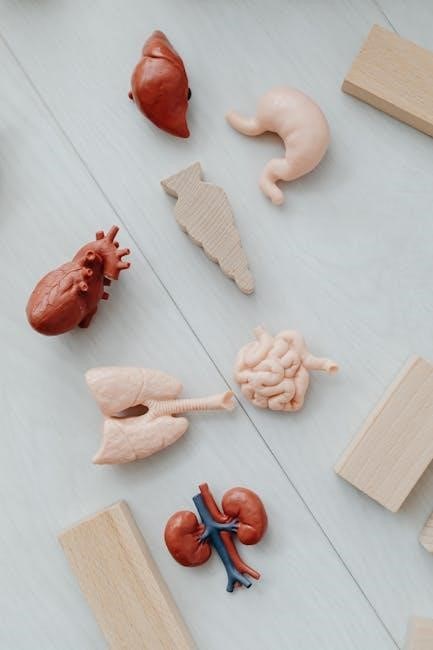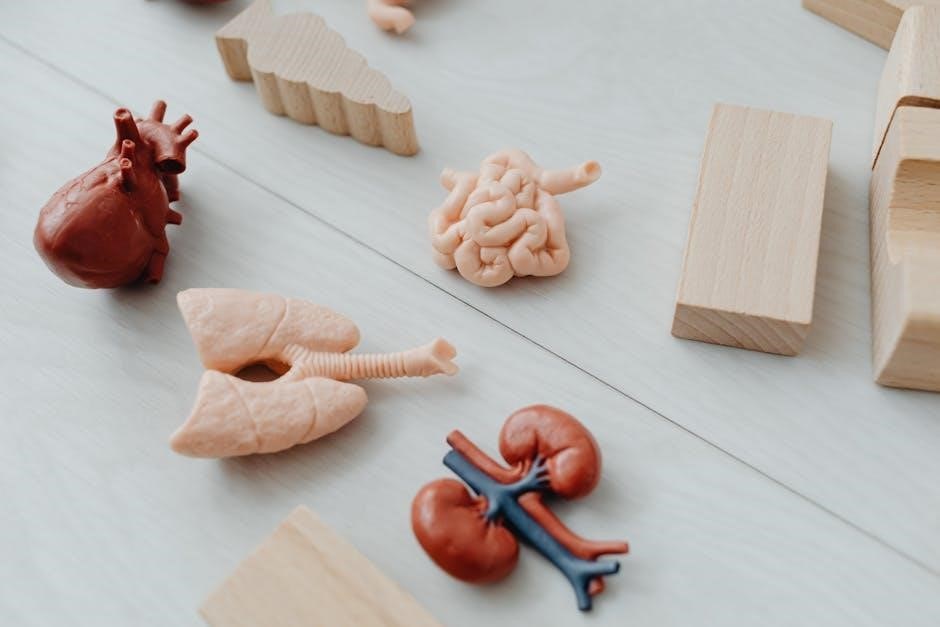
study guide for biology midterm
The biology midterm study guide is a helpful resource for students, covering key topics and providing an overview of the course material in a clear and concise manner with relevant information and examples online.
Overview of the Study Guide
The study guide for the biology midterm exam is designed to assist students in preparing for the test by providing a comprehensive overview of the course material. The guide is divided into sections, each focusing on a specific unit of the course, and includes a variety of study aids such as review questions, practice problems, and key term definitions. By using the study guide, students can identify areas where they need to focus their studying and develop a study plan that will help them achieve their goals. The guide is also a useful resource for students who want to review the material before the exam, and can be used in conjunction with other study aids such as textbooks and online resources. Overall, the study guide is an essential tool for students who want to succeed on the biology midterm exam and achieve their academic goals. The guide is easy to use and understand, making it a valuable resource for students of all learning styles.

Unit 1: The Scientific Method
The scientific method is a process used to develop and test scientific knowledge and theories online with relevant information and examples available.
Key Components of the Scientific Method
The scientific method consists of several key components, including observation, question, hypothesis, prediction, and experimentation. These components work together to form a process that allows scientists to develop and test theories. The observation component involves noticing something and wondering about it, while the question component involves asking a specific question about the observation. The hypothesis component involves making an educated guess about the answer to the question, and the prediction component involves predicting what will happen if the hypothesis is correct. The experimentation component involves testing the hypothesis through experimentation and data collection. By following these components, scientists can ensure that their research is thorough and accurate. The scientific method is an essential tool for scientists, and it has been used to develop many of the theories and laws that we use today. It provides a clear and systematic way of thinking and problem-solving.

Unit 2: Characteristics of Life
Living organisms have unique characteristics, including growth and reproduction, with online resources available to study these concepts thoroughly every day.
Defining Characteristics of Living Organisms
To understand the characteristics of life, it is essential to study the defining features of living organisms, including growth, reproduction, and response to stimuli. Online resources provide a comprehensive overview of these concepts, enabling students to grasp the fundamental principles of biology. The study guide for biology midterm covers the key characteristics of living organisms, such as metabolism, homeostasis, and evolution, which are crucial for understanding the complexities of life. By examining the defining characteristics of living organisms, students can develop a deeper understanding of the natural world and the principles that govern it. The internet offers a wealth of information on this topic, including study guides, tutorials, and educational videos, making it easier for students to prepare for their biology midterm exam and achieve academic success. Effective study habits and a thorough understanding of the material are essential for performing well on the exam.

Unit 3: Macromolecules
Macromolecules include carbohydrates, proteins, and nucleic acids, playing crucial roles in biological processes and systems naturally online.
Types and Functions of Macromolecules
Macromolecules are essential components of living organisms, and their functions are diverse and critical to life. The four main types of macromolecules are carbohydrates, proteins, lipids, and nucleic acids. Carbohydrates serve as energy sources, while proteins perform a wide range of functions, including enzyme activity and structural support. Lipids, including fats and oils, are important for energy storage and cell membrane structure. Nucleic acids, such as DNA and RNA, store and transmit genetic information. Understanding the types and functions of macromolecules is crucial for grasping biological processes and systems. The study guide provides an overview of these macromolecules, their structures, and their roles in living organisms, helping students to prepare for the midterm exam and develop a deeper understanding of biology. By reviewing the types and functions of macromolecules, students can gain a solid foundation in biology and improve their academic performance.

Unit 4: Cell Structure and Function
Cell structure and function are crucial biology topics, including cell membranes and organelles, with online resources available to aid studying and understanding.
Understanding Cell Components and Processes
To understand cell components and processes, students should review the structure and function of cell membranes, organelles, and other cellular components. The cell membrane is a thin layer of lipid and protein molecules that surrounds the cell and regulates the movement of materials in and out. Organelles, such as the nucleus, mitochondria, and endoplasmic reticulum, perform specific functions necessary for cell survival. Cellular processes, including photosynthesis, cellular respiration, and cell division, are also essential topics to study. Online resources, such as diagrams, videos, and interactive tutorials, can help students visualize and understand these complex concepts. By reviewing and practicing with online study guides and quizzes, students can assess their knowledge and identify areas for further review. Understanding cell components and processes is critical for success in biology and future science courses. With dedication and the right resources, students can master these topics and achieve their academic goals. Effective studying and review of cell biology concepts will help students prepare for the midterm exam.
Preparing for the Midterm Exam
Preparing for the midterm exam requires a strategic approach to studying and reviewing course material. Students should start by reviewing their notes and textbook, focusing on key concepts and topics covered in the study guide. Online resources, such as practice quizzes and flashcards, can help students assess their knowledge and identify areas for further review. It is also essential to practice with sample questions and case studies to develop critical thinking and problem-solving skills. Additionally, students can form study groups to collaborate and learn from one another. By creating a study schedule and sticking to it, students can ensure they are well-prepared for the exam. Effective time management and a positive attitude are also crucial for success. With careful preparation and dedication, students can feel confident and ready to tackle the midterm exam. A well-organized study plan and consistent review of course material will help students achieve their academic goals and perform well on the exam. Regular review and practice will also help to reduce stress and anxiety on the day of the exam.
Related Posts
the extra academy survival guide
Navigating the extra academy jungle? This survival guide is your secret weapon! Conquer classes, make friends, and thrive. Your extra academy journey starts here!
retribution paladin leveling guide wotlk
Tired of slow leveling? Our Retribution Paladin guide for WotLK will have you smashing faces and reaching 80 in no time! Gear, tips, and tricks inside.

amellwind’s guide to monster hunting
Learn monster hunting with Amellwind’s expert guide and tips at Fihimafihi